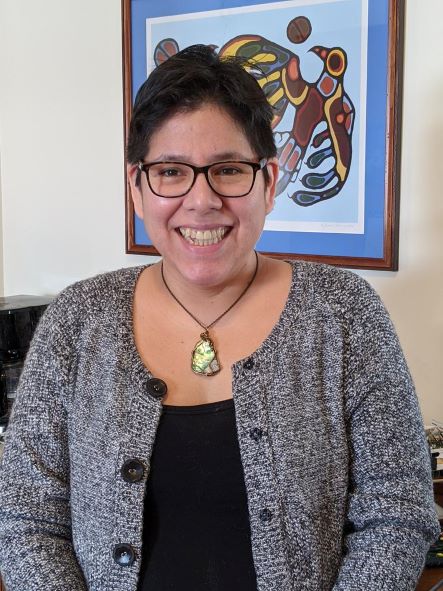 Nishnaabemwin, a dialect of Anishinaabemowin, an Indigenous language spoken by communities in the Southern Great Lakes, has been in decline as early as the 1970s. Evidence suggest that there are only about 20 first language speakers today on Walpole Island First Nation.
Nishnaabemwin, a dialect of Anishinaabemowin, an Indigenous language spoken by communities in the Southern Great Lakes, has been in decline as early as the 1970s. Evidence suggest that there are only about 20 first language speakers today on Walpole Island First Nation.
Neebnookwe (Summer Sands-Macbeth) wants to develop and implement language programs that will help preserve and teach this Indigenous language.
Sands-Macbeth was born and raised on Walpole Island First Nation and grew up surrounded by the language and culture of her parents who were both first language speakers.
“In school, there was very little taught surrounding our language and culture,” says Sands-Macbeth, an Indian Day School survivor. “No one was fluent in the language at my age.”
In 1997, she traveled to Guatemala to learn Spanish. She noted the way the teachers taught verb conjugations and realized that their teaching style may have relevance to teaching Nishnaabemwin.
However, when she moved back home in 2005, Sands-Macbeth noticed that language classes had not changed. Despite the introduction of occasional new teaching trends, the language instruction, methods, and resources had not differed much.
“They were still teaching the language the same way as when I was a young girl,” says Sands-Macbeth. “Some of the new teachers were in fact only memorizing words instead of, for instance, teaching verb conjugations.”
In response, Sands-Macbeth decided to try and innovate on the language and culture programming in her community. However, she recognized an opportunity to have a greater impact when she heard about the World Indigenous Studies in Education (WISE) Program at Queen’s through a work-related meeting with Lindsay Morcom.
In July 2020, she enrolled in the WISE program, where she is interested in developing a language program that can be used to teach this indigenous language.
“I would really be interested in working in other Nishnaabeg communities that are coming up with innovative ways to teach their language, and develop a program with them,” says Sands–Macbeth.
In her free time, Sands-Macbeth enjoys spending time with her wife and children and learning more about local history.